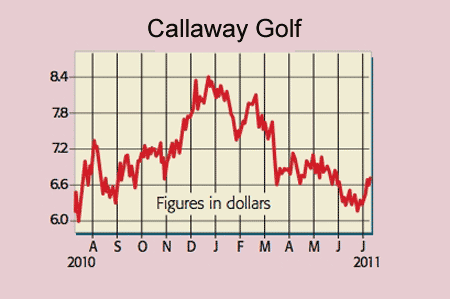
While visiting friends recently I was asked what investors should be doing with their money. I suggested looking for unloved stocks with good recovery prospects and solid balance sheets. An example of just such a stock is Callaway, the golf products retailer.
Callaway sells top-notch golf equipment, such as clubs, balls and accessories, under the Callaway, Big Bertha, Ben Hogan and Top-Flite brands. Those are all names well known to the golfing fraternity, thanks to endorsements from professionals such as Phil Mickelson, Arnold Palmer and Graeme McDowell. Turnover is split roughly 50:50 between America and overseas, with the company’s chief competitors being Nike, TaylorMade, Ping, Mizuno and Titleist.
However, over the past two years performance has been handicapped by poor demand as many punters have deferred upgrading their kit due to the recession.
Moreover, the number of rounds played in America this year is down 6.3% on 2010, according to research firm Golf Datatech. Worse still, on 29 June the company played its latest errant tee shot, reporting that the chief executive had resigned when second-quarter revenues (of $270m) fell short of analyst expectations (of $307m).
Callaway Golf (NYSE: ELY)
The new interim boss, Anthony Thornley, has wasted no time in announcing measures to shave off $50m in costs by making redundancies and other savings. Of course, this recovery plan will take time to kick-in. Indeed, the firm probably won’t return to the black until next year, when it is forecast to earn 29 cents per share.
Nonetheless, prospects are improving. Golf may join the ranks of Olympic sports at the 2016 games in Brazil. Throw in the growing number of retirees who buy more than half of all golf equipment and there are the makings of a strong rebound when the current storms eventually subside.
With regard to valuation, I believe Callaway should be able to achieve sales of $1bn by 2013, and deliver sustainable earnings before interest, tax and amortisation (EBITA) margins of 10%. On this basis – discounting back at 12% and using a ten-times multiple – I generate an intrinsic value of about $9 per share.
Possible sand traps are cut-throat competition and exposure to the cyclical nature of the sports-leisure industry, difficulties implementing restructuring plans and currency fluctuations. That said, even if the turnaround doesn’t meet expectations, the group could easily attract a takeover bid within this consolidating sector.
Second-quarter results are due out on 26 July.
Rating: SPECULATIVE BUY at $6.70 (market cap $430m)